
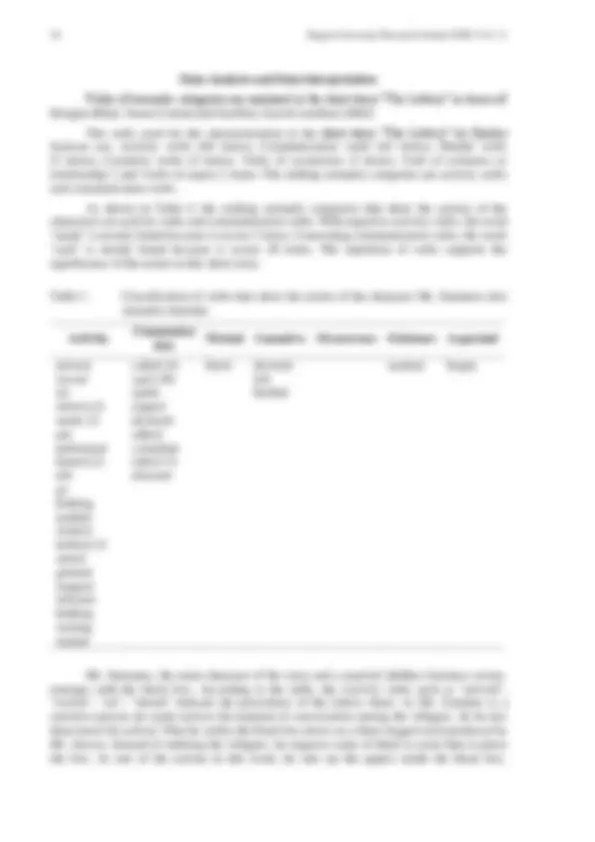
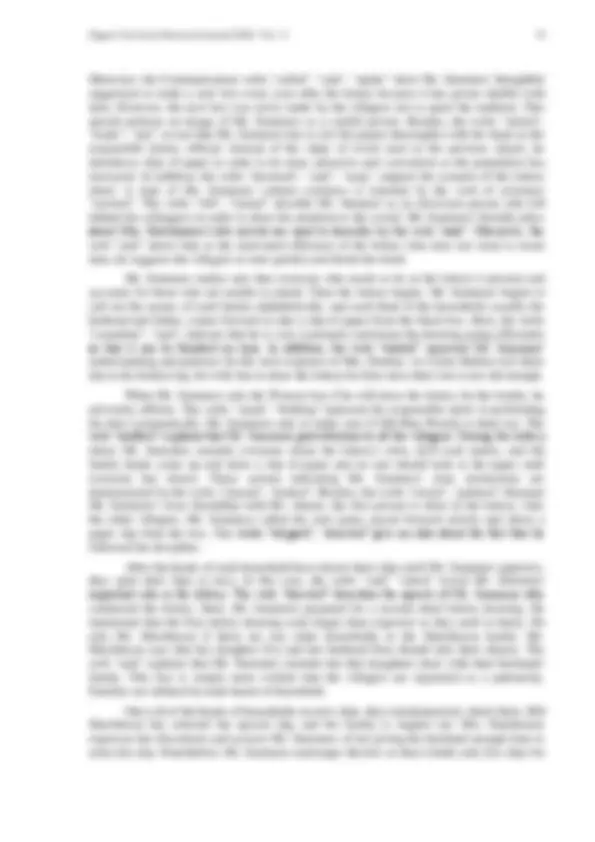
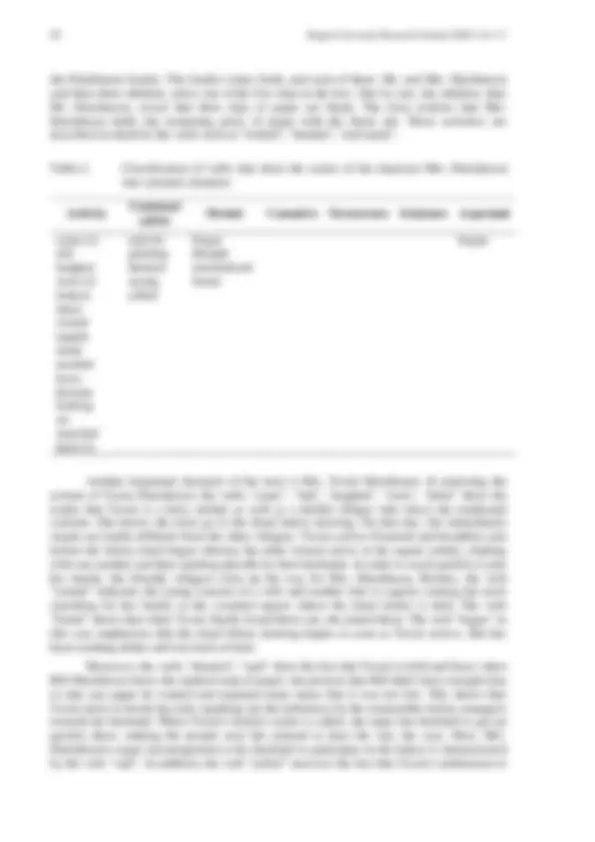
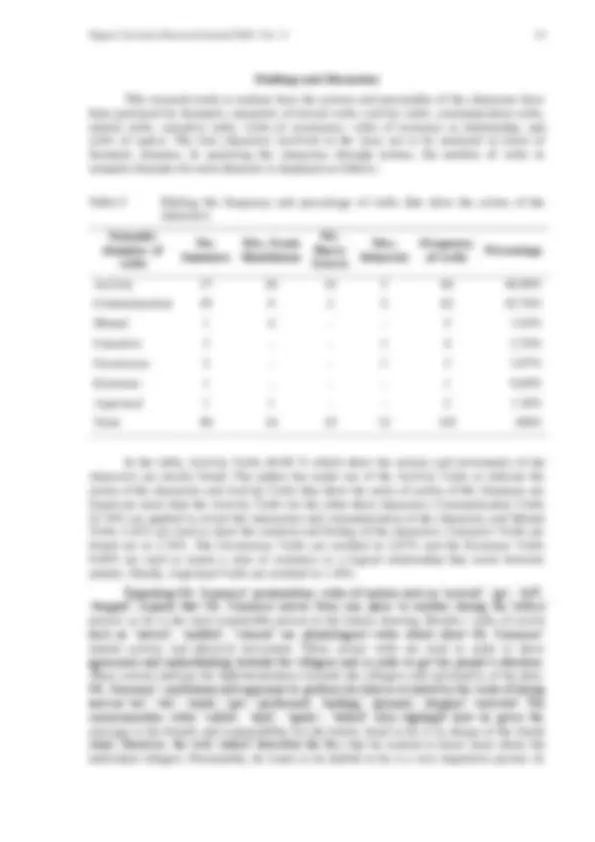
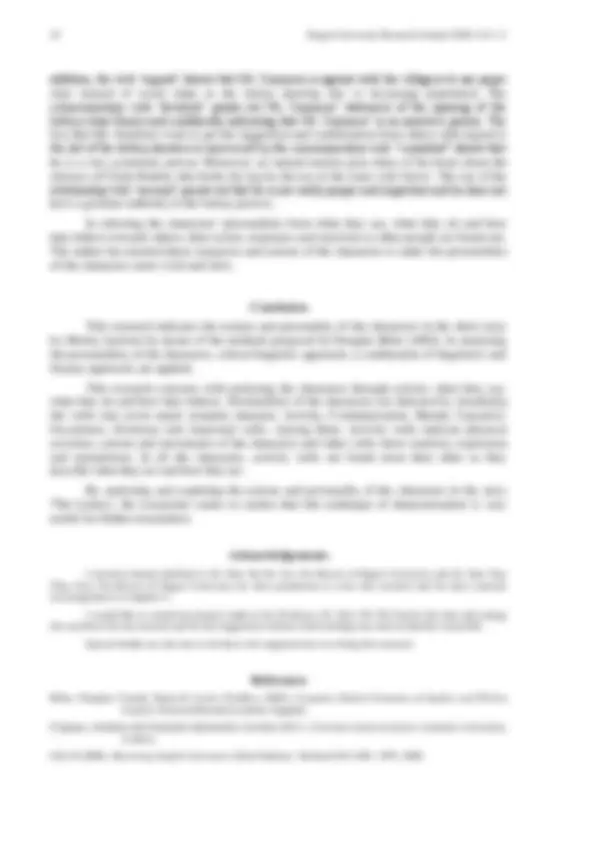



Study with the several resources on Docsity

Earn points by helping other students or get them with a premium plan


Prepare for your exams
Study with the several resources on Docsity

Earn points to download
Earn points by helping other students or get them with a premium plan
Community
Ask the community for help and clear up your study doubts
Discover the best universities in your country according to Docsity users
Free resources
Download our free guides on studying techniques, anxiety management strategies, and thesis advice from Docsity tutors
This research paper explores the characterization in Shirley Jackson's short story 'The Lottery' by identifying and analyzing the semantic categories of lexical verbs used for each main character: Mr. Summers, Mrs. Hutchinson, and Mr. Graves. The study focuses on activity verbs and communication verbs, as they reveal the actions and personality traits of the characters, according to Douglas Biber's semantic categories.
Typology: Study notes
1 / 10

This page cannot be seen from the preview
Don't miss anything!







Thin Thin Mon^1
Abstract This research focuses on actions and personality of the characters in the short story 'The Lottery' by Shirley Jackson. As Shirley Jackson's literary output is very great in degree, it is impossible to study all her literary works. Among the literary works, the story 'The Lottery ' is selected as the material for the research and the research area is restricted to characterisation, with an emphasis on the verbs that show actions and personality of the characters in the story „The Lottery‟. The objectives of the research are to identify the semantic categories of lexical verbs and to explore the verbs that indicate actions and personality of the main characters in the short story „The Lottery‟. The verbs which portray the characters are identified in terms of Douglas Biber‟s semantic categories (2002): activity verbs, communication verbs, mental verbs, causative verbs, verbs of occurrence, verbs of existence or relationship and verbs of aspect. Based on the semantic categories of verbs, the research points out how the characters behave, what they do and what types of personalities they have. And it also gives the moral lesson to the readers through the portrayal of the characters. It is recommended that further researches should be done within linguistic aspects (using Functional Grammar or Case Grammar) and within the scope of literary criticism (exploring themes, point of view, plot and setting). Keywords: Actions, Personality, Characterisation, Lottery
Introduction "The Lottery” is the highly controversial and famous short story about a village that partakes in an annual death ritual by Shirley Jackson. This study focuses on actions and personality of the characters in the short story “The Lottery”. According to van Peer (1988), “Character, it can be hardly denied, is what readers infer from words, sentences, paragraphs and textual composition depicting, describing or suggesting actions, thoughts, utterances or feelings of a protagonist”. By exploring the use of semantic categories of lexical verbs that show actions and personality of the characters in the story “The Lottery”, one can observe how Shirley Jackson writes this story to achieve a maximum effectiveness.
Aim and Objectives The aim of this research is to analyze how the characters are portrayed by means of semantic categories of lexical verbs in Shirley Jackson's short story "The Lottery". The objectives of this research are to identify the semantic domains of lexical verbs and to explore the verbs that show actions and personality of the main characters in the short story "The Lottery".
Literature Review In order to assess what knowledge exists and what is generally accepted with regard to this research, a theory concerning characterisation is presented.
(^1) Lecturer, Department of English, Dagon University
Summary of the Short Story
The location of this story was set in New England. In this story, on a warm day in late June, villagers gathered in the square to participate in a lottery run by Mr. Summers who officiated at all the big civic events. The children arrived first and began collecting stones until their parents call them to order. Mrs. Hutchinson arrived late and chatted briefly with her friend, Mrs. Delacroix. Mr. Summers called each head of the household (always a grown man) forward a black wooden box, where each selected a slip of paper. Once the men had chosen, Mr. Summers allowed everyone to open the paper and see who had been selected. The lucky person selected is Bill Hutchinson. His wife immediately started protesting. There are altogether five people in the Hutchinson family. Mr. Summers placed five slips of paper into the box and each member of the family drew. Mrs. Tess Hutchinson drew a slip of paper with a big black dot in the centre. The villagers advanced on her, and it became clear what the prize for the lottery really was: stoning to death. Tess protested in vain as the villagers attacked her.
Research Methodology Material The material used in the research is the short story „The Lottery” written by Shirley Jackson, an acclaimed American writer of the short story “The Lottery” as well as longer works like “We Have Always Lived in the Castle”. The story was published in the June 26, 1948 issue of The New Yorker. The story reflects Jackson‟s own life: she continually struggled with the expectations that her mother and later her husband forced upon her. She not only supported their family, including four children, with her literary career but also managed the daily household responsibilities. The story explores ideas such as communal violence, individual vulnerability, and the dangers of blindly following tradition.
Method This research is mainly based on the analysis of semantic categories. Lexical verbs are examined in terms of Douglas Biber's method (2002). According to Douglas Biber, Susan Conrad and Geoffrey Leech's method (2002), semantic domains are generally distinguished seven categories: activity verbs, communication verbs, mental verbs, causative verbs, verbs of occurrence, verbs of existence or relationship, and verbs of aspect. Activity verbs usually refer to a volitional activity–that is, an action performed intentionally by an agent or "doer". The second type of semantic category is communication verbs which are a special subcategory of activity verbs that involve communication activities, particularly verbs describing speech and writing. Mental verbs refer to mental states and activities. Causative verbs, such as, allow, cause, force, and help indicate that some person or thing helps to bring about a new state of affairs. These verbs often occur with a derived noun as the direct object, which reports the action that was facilitated. Verbs of occurrence report events that occur without an actor. Often the subjects of these verbs are affected by the event that is described by the verb. Verbs of existence or relationship report a state of existence or a logical relationship that exists between entities. Verbs of aspect characterize the stage of progress of an activity. These verbs usually occur with a complement clause following the verb.
Procedures
The procedures for analyzing the characters are as follows: (1) Collecting the verbs that show actions and personality of the characters to explore the characters through action and classifying them. (2) Exploring the actions of the characters in order to infer personalities of the characters from their behaviour towards others.
Moreover, the Communication verbs "called", "said", "spoke" show Mr. Summers' thoughtful suggestion to make a new box every year after the lottery because it has grown shabby with time. However, the new box was never made by the villagers not to upset the tradition. This speech portrays an image of Mr. Summers as a careful person. Besides, the verbs "stirred", "made", "put", reveal that Mr. Summers has to stir the papers thoroughly with his hand as the responsible lottery official. Instead of the chips of wood used in the previous rituals, he introduces slips of paper in order to be more attractive and convenient as the population has increased. In addition, the verbs "declared", "said", "sang", support the scenario of the lottery ritual. A state of Mr. Summers' solemn existence is reported by the verb of existence "seemed". The verbs "left", "turned" describe Mr. Summer as an observant person who left behind his colleagues in order to show his attention to the crowd. Mr. Summers' friendly jokes about Mrs. Hutchinson‟s late arrival are used to describe by the verb "said". Moreover, the verb "said" shows that as the motivated officiator of the lottery who does not want to waste time, he suggests the villagers to start quickly and finish the ritual.
Mr. Summers makes sure that everyone who needs to be at the lottery is present and accounts for those who are unable to attend. Then the lottery begins. Mr. Summers begins to call out the names of each family alphabetically, and each head of the household, usually the husband and father, comes forward to take a slip of paper from the black box. Here, the verbs "consulted", "said", indicate that he is very systematic and keeps the drawing going efficiently so that it can be finished on time. In addition, the verb “waited” uncovers Mr. Summers' understanding and patience for the slow response of Mrs. Dunbar. As Clyde Dunbar isn't there due to his broken leg, his wife has to draw the lottery for him since their son is not old enough.
When Mr. Summers asks the Watson boy if he will draw the lottery for the family, he nervously affirms. The verbs "made" "holding" represent his responsible spirit in performing his duty systematically. Mr. Summers asks to make sure if Old Man Warner is there too. The verb “nodded” explains that Mr. Summers paid attention to all the villagers. During the lottery ritual, Mr. Summers reminds everyone about the lottery's rules, he'll read names, and the family heads come up and draw a slip of paper and no one should look at the paper until everyone has drawn. These actions indicating Mr. Summers' clear instructions are demonstrated by the verbs "cleared", "looked". Besides, the verbs "raised", "grinned" illustrate Mr. Summers' close friendship with Mr. Adams, the first person to draw in the lottery. Like the other villagers, Mr. Summers called his own name, paced forward strictly and chose a paper slip from the box. The verbs “stepped", "selected" give an idea about the fact that he followed the discipline.
After the heads of each household have drawn their slips until Mr. Summers approves, they open their slips at once. In this case, the verbs "said" "asked" reveal Mr. Summers' important role in the lottery. The verb "directed” describes the speech of Mr. Summers who conducted the lottery. Here, Mr. Summers prepared for a second ritual lottery drawing. He mentioned that the first lottery drawing took longer than expected so they need to hurry. He asks Mr. Hutchinson if there are any other households in the Hutchinson family. Mr. Hutchinson says that her daughter Eva and her husband Don should take their chance. The verb "said" explains that Mr. Summers reminds her that daughters draw with their husbands' family. This fact is simply more evident that the villagers are organized as a patriarchy. Families are defined by male heads of household.
Once all of the heads of households receive slips, they simultaneously check them. Bill Hutchinson has selected the special slip, and his family is singled out. Mrs. Hutchinson expresses her discontent and accuses Mr. Summers of not giving her husband enough time to select his slip. Nonetheless, Mr. Summers rearranges the box so that it holds only five slips for
the Hutchinson family. The family comes forth, and each of them, Mr. and Mrs. Hutchinson and their three children, select one of the five slips in the box. One by one, the children, then Mr. Hutchinson, reveal that their slips of paper are blank. The town realizes that Mrs. Hutchinson holds the remaining piece of paper with the black dot. These activities are described in detail by the verbs such as "looked", "hushed", "and made".
Table 2. Classification of verbs that show the action of the character Mrs. Hutchinson into semantic domains
Activity Communi cation Mental Causative Occurrence Existence Aspectual
came (2) slid laughed went (2) looked dried craned tapped made reached leave hesitate looking set snatched held (2)
said (6) grinning shouted saying yelled
forgot thought remembered found
began
Another important character of the story is Mrs. Tessie Hutchinson. In analyzing the actions of Tessie Hutchinson, the verbs "came", "slid", "laughed", "went", "dried" show the reader that Tessie is a busy mother as well as a dutiful villager who obeys the traditional customs. She knows she must go to the ritual lottery drawing. On that day, she immediately stands out totally different from the other villagers. Tessie arrives flustered and breathless just before the lottery ritual began whereas the other women arrive at the square calmly, chatting with one another and then standing placidly by their husbands. In order to reach quickly to join her family, the friendly villagers clear up the way for Mrs. Hutchinson. Besides, the verb "craned" indicates the caring concern of a wife and mother who is eagerly craning her neck searching for her family in the crowded square where the ritual lottery is held. The verb "found" shows that when Tessie finally found them out, she joined them. The verb "began" in this case emphasizes that the ritual lottery drawing begins as soon as Tessie arrives. She has been washing dishes and lost track of time.
Moreover, the verbs "shouted", "said" show the fact that Tessie is bold and brave when Bill Hutchinson draws the marked strip of paper: she protests that Bill didn't have enough time to take any paper he wanted and repeated many times that it was not fair. This shows that Tessie dares to break the rules speaking out the unfairness by the responsible lottery managers towards her husband. When Tessie's family's name is called, she urges her husband to get up quickly there, making the people near her amused to hear the way she says. Here, Mrs. Hutchinson's eager encouragement to her husband to participate in the lottery is demonstrated by the verb "said". In addition, the verb "yelled" uncovers the fact that Tessie's enthusiasm to
Summers' coal company. Moreover, the verb "swearing-in" shows that Mr. Graves swears in Mr. Summers as the lottery official before the lottery begins. In addition, the verbs "nodded" and "held" reveal Mr. Graves' obedience towards Mr. Summers who wields a frightening amount of power as the lottery conductor. During the lottery drawing, before Mr. Graves puts the five slips of paper selected for the Hutchinsons, he drops the other paper slips onto the ground. These actions of Mr. Graves are obviously described by the verbs "selected", "put", "dropped". Besides, the verbs "took", "removed" "held" also represent the fact that as Mr. Graves was told to help little Dave, draw a paper from the box and then looks at it to determine if Dave's going to be the village's chosen victim. However, he is not chosen. Moreover, the verbs "opened" and "held" reveal Mr. Graves' action in taking little Dave Hutchinson's paper from his clenched fist and opening it. It can be assumed that this lottery drawing will be Dave's first introduction to mortality, as he participates in the violent death of his mother. It seems to be appropriate that Graves is the powerful person who initiates the lottery resulting the brutal lessons of life, human nature, injustice, misuse of power and ultimate death.
Table 4. Classification of verbs that show the action of the character Mrs. Delacroix into semantic domains
Activity Communicati on Mental Causative Occurrence Existence Aspectual
stood selected pick turn laughed
said (3) talking called
held got
The personality of the fourth character "Mrs. Delacroix" is only lightly sketched in and not described in detail. She is a friend of Mrs. Tessie Hutchinson. The Activity verbs "stood" "laughed” indicate the actions of Mrs. Delacroix whose name means of-the- cross in French. She is explained by Mrs. Hutchinson why she is late. Mrs. Hutchinson has forgotten about the date of the lottery drawing until she realizes the absence of her children. Mrs. Delacroix reassures Mrs. Hutchinson that she didn't miss anything. At first, Mrs. Delacroix is chatting happily with Mrs. Graves and Mrs. Tess Hutchinson. It is found strikingly that Mrs. Delacroix is the only person who speaks to the silent Mrs. Graves, wife of the even more silent postmaster. Here, the verb "said" indicates the gossip between Mrs. Delacroix and Mrs. Graves in the back row about how time flies. The last lottery seems to be very recent. Mrs. Delacroix's friendly relationship with the Graves family foreshadows her eagerness to let Tess Hutchinson die. Besides, the Activity verb and the Communication verb "held", "said" reveal Mrs. Delacroix's visible nervousness as her husband moves forward. When Delacroix is called, Mrs. Delacroix holds her breath. Here, the verb "called" shows Mrs. Delacroix's anger towards Tessie for her childish behaviour when she protests again that the lottery wasn't fair. Moreover, the verbs "selected", "picked", "turned", uncover that Mrs. Delacroix chooses an especially giant stone to throw at her friend as Mrs. Dunbar tells her to start stoning. In this case, the lottery appears completely natural to Mrs. Delacroix, so much so that it doesn't seem to her as a contradicting behaviour to chat happily with Tess one minute before attacking Mrs. Hutchinson.
Findings and Discussion This research tends to analyze how the actions and personality of the characters have been portrayed by Semantic categories of lexical verbs: activity verbs, communication verbs, mental verbs, causative verbs, verbs of occurrence, verbs of existence or relationship, and verbs of aspect. The four characters involved in the story are to be analyzed in terms of Semantic domains. In analyzing the characters through actions, the number of verbs in semantic domains for each character is displayed as follows:
Table 5. Finding the frequency and percentage of verbs that show the action of the characters Semantic domains of verbs
Mr. Summers
Mrs. Tessie Hutchinson
Mr. Harry Graves
Mrs. Delacroix
Frequency of verbs Percentage
Activity 27 20 16 5 68 46.90% Communication 45 9 3 5 62 42.76% Mental 1 4 - - 5 3.45% Causative 3 - - 1 4 2.76% Occurrence 2 - - 1 3 2.07% Existence 1 - - - 1 0.69% Aspectual 1 1 - - 2 1.38% Total 80 34 19 12 145 100%
In the table, Activity Verbs 46.90 % which show the actions and movements of the characters are mostly found. The author has made use of the Activity Verbs to indicate the action of the characters and Activity Verbs that show the series of action of Mr. Summers are found out more than the Activity Verbs for the other three characters. Communication Verbs 42.76% are applied to reveal the interaction and communication of the characters and Mental Verbs 3.45% are used to show the emotion and feeling of the characters. Causative Verbs are found out in 2.76%. The Occurrence Verbs are resulted in 2.07% and the Existence Verbs 0.69% are used to report a state of existence or a logical relationship that exists between entities. Finally, Aspectual Verbs are resulted in 1.38%.
Regarding Mr. Summers‟ personalities, verbs of motion such as „arrived‟, „go‟, „left‟, „stepped‟ express that Mr. Summers moves from one place to another during the lottery process as he is the most responsible person in the lottery drawing. Besides, verbs of action such as „waved‟, „nodded‟, „cleared‟ are physiological verbs which show Mr. Summers‟ mental activity and physical movement. These action verbs are used in order to show agreement and understanding towards the villagers and in order to get the people‟s attention. These actions indicate his light-heartedness towards the villagers and seriousness of his duty. Mr. Summers‟ carefulness and eagerness to perform his duty is revealed by the verbs of doing such as „set‟, „stir‟, „made‟, „put‟, „performed‟, „holding‟, „grinned‟, „stepped‟, „selected‟. The communication verbs „called‟, „said‟, „spoke‟, „talked‟ only highlight how he gives the message to his friends and responsibility for the lottery ritual as he is in charge of the brutal ritual. However, the verb „asked‟ describes the fact that he wanted to know more about the individual villagers. Presumably, he wants to be dutiful or he is a very inquisitive person. In
Kenny, W.(1966). How to Analyze Fiction. Monarch Press, New York.
Pickering, H.J and Hoeper, D.J (1986). Literature. Macmillan Publishing Ltd. New York.
Richard, Jack, Platt, John & Weber Heidi (1985); Longman Dictionary of Applied Linguistics. Longman Group Limited, England.
https://www.newyorker.com
https://en-m.wikipedia.org>wiki